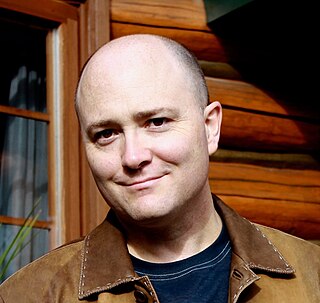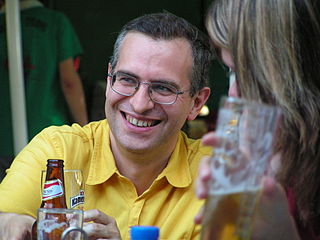Anarcho-capitalism is a political philosophy and economic theory that advocates the elimination of centralized states in favor of a system of private property enforced by private agencies, free markets and the right-libertarian interpretation of self-ownership, which extends the concept to include control of private property as part of the self. In the absence of statute, anarcho-capitalists hold that society tends to contractually self-regulate and civilize through participation in the free market which they describe as a voluntary society. In a theoretical anarcho-capitalist society, the system of private property would still exist and be enforced by private defense agencies and insurance companies selected by customers which would operate competitively in an open market and fulfill the roles of courts and the police. Anarcho-capitalists claim that various theorists have espoused philosophies similar to anarcho-capitalism. However, anarcho-capitalism was developed in the 20th century and the first person to use the term anarcho-capitalism was Murray Rothbard. Rothbard synthesized elements from the Austrian School, classical liberalism and 19th-century American individualist anarchists and mutualists Lysander Spooner and Benjamin Tucker while rejecting their labor theory of value and the anti-capitalist and socialist norms they derived from it. Rothbard's anarcho-capitalist society would operate under a mutually agreed-upon "legal code which would be generally accepted, and which the courts would pledge themselves to follow". This legal code would recognize contracts, private property, self-ownership and tort law in keeping with the non-aggression principle.

Murray Newton Rothbard was an American heterodox economist of the Austrian School, economic historian and political theorist. Rothbard was the founder and leading theoretician of anarcho-capitalism, a staunch advocate of historical revisionism and a central figure in the 20th-century American libertarian movement. He wrote over twenty books on political theory, revisionist history, economics, and other subjects.

The Machinery of Freedom is a nonfiction book by David D. Friedman that advocates an anarcho-capitalist society from a utilitarian/consequentialist perspective.
Libertarians have differing opinions on the validity of intellectual property.
The libertarian perspective on immigration is often regarded as one of the core concepts of libertarian theory and philosophy. There is considerable disagreement among libertarians as to what stance towards immigration best accords with libertarian principles. Some hold that restrictions on immigration are an infringement of the rights of immigrants and other property owners and constitute a threat to individual liberty. Others maintain that open borders amount to a policy of forced integration on the part of the state, and that protecting the rights of property holders requires that present governments adopt much more discriminatory policies on who is allowed to enter a country.

Hans-Hermann Hoppe is a German-American paleolibertarian and anarcho-capitalist political theorist. He is Professor Emeritus of Economics at the University of Nevada, Las Vegas (UNLV), Senior Fellow of the Ludwig von Mises Institute, and the founder and president of the Property and Freedom Society.
Libertarian theories of law build upon classical liberal and individualist doctrines.

Paleolibertarianism is a right wing populist political strategy and variety of libertarianism developed by American anarcho-capitalist theorists Murray Rothbard and Lew Rockwell that seeks to deliver the libertarian ideas of opposition to government intervention to the common persons of popular —working and middle— classes, using friendly messages with their common cultural norms. With these methods it is expected to connect the modern libertarian movement with anti-socialist, anti-war and popular values found in the American classical liberal movement of the first half of the 20th century that was part of the anti-New Deal Old Right —and move it away from the influence of public policy libertarian organizations based in Washington, DC., who are accused of give up communicating the complete libertarian message while adopting the political and cultural values of the US capital to gain acceptance among the political elite.

The homestead principle is the principle by which one gains ownership of an unowned natural resource by performing an act of original appropriation. Appropriation could be enacted by putting an unowned resource to active use, joining it with previously acquired property or by marking it as owned.
The non-aggression principle (NAP), also called the non-aggression axiom, is a concept in which aggression, defined as initiating or threatening any forceful interference with either an individual or their property, is inherently wrong. It is considered by some to be a defining principle of libertarianism in the United States and is also a prominent idea in anarcho-capitalism and minarchism. In contrast to pacifism, the NAP does not forbid forceful defense. There is no single or universal interpretation or definition of the NAP as it faces several definitional issues, including those revolving around intellectual property, force, abortion, and other topics.

Norman Stephan Kinsella is an American intellectual property lawyer, author, and deontological anarcho-capitalist. His legal works have been published by Oxford University Press, Oceana Publications, Mises Institute, Quid Pro Books and others.
Libertarianism in the United States is a political philosophy and movement promoting individual liberty. According to common meanings of conservatism and liberalism in the United States, libertarianism has been described as conservative on economic issues and liberal on personal freedom, often associated with a foreign policy of non-interventionism. Broadly, there are four principal traditions within libertarianism, namely the libertarianism that developed in the mid-20th century out of the revival tradition of classical liberalism in the United States after liberalism associated to the New Deal; the libertarianism developed in the 1950s by anarcho-capitalist author Murray Rothbard, who based it on the anti-New Deal Old Right and 19th-century libertarianism and American individualist anarchists such as Benjamin Tucker and Lysander Spooner while rejecting the labor theory of value in favor of Austrian School economics and the subjective theory of value; the libertarianism developed in the 1970s by Robert Nozick and founded in American and European classical liberal traditions; and the libertarianism associated to the Libertarian Party which was founded in 1971, including politicians such as David Nolan and Ron Paul.
Right-libertarianism, also known as libertarian capitalism or right-wing libertarianism, is a political philosophy and type of libertarianism that supports capitalist property rights and defends market distribution of natural resources and private property. The term right-libertarianism is used to distinguish this class of views on the nature of property and capital from left-libertarianism, a type of libertarianism that combines self-ownership with an egalitarian approach to natural resources. In contrast to socialist libertarianism, right-libertarianism supports free-market capitalism. Like most forms of libertarianism, it supports civil liberties, especially natural law, negative rights and a major reversal of the modern welfare state.

The Ethics of Liberty is a 1982 book by American philosopher and economist Murray N. Rothbard, in which the author expounds a libertarian political position.
Libertarian conservatism, also referred to as conservative libertarianism and conservatarianism, is a political philosophy that combines conservatism and libertarianism, representing the libertarian wing of conservatism and vice versa.
This article is a list of major figures in the theory of libertarianism, a philosophy asserting that individuals have a right to be free. Originally coined by French anarchist and libertarian communist Joseph Déjacque as an alternative synonymous to anarchism, American classical liberals decided to appropriate the term in the 1950s for their philosophy which asserts that individuals have a right to acquire, keep and exchange their holdings and that the primary purpose of government is to protect these rights.

The position that taxation is theft, and therefore immoral, is found in a number of political philosophies considered radical. It marks a significant departure from conservatism and classical liberalism. This position is often held by anarcho-capitalists, objectivists, most minarchists, right-wing libertarians, and voluntaryists.
The following outline is provided as an overview of and topical guide to libertarianism, a political philosophy that upholds liberty as its principal objective. As a result, libertarians seek to maximize autonomy and freedom of choice, emphasizing political freedom, voluntary association and the primacy of individual judgment.

The title-transfer theory of contract (TTToC) is a legal interpretation of contracts developed by economist Murray Rothbard and jurist Williamson Evers. The theory interprets all contractual obligations in terms of property rights, viewing a contract as a bundle of title transfers. According to Randy Barnett, The TTToC stands in oppositions to most mainstream contract theories which view contractual obligations as the result of a binding promise. Proponents of the approach often claim it is superior on grounds of both consistency and ethical considerations. The TTToC is often supported by libertarians.

Carlo Lottieri is Professor of Political Philosophy at the University of Verona. He holds a bachelor's degree in Philosophy from the University of Genoa, a M.A. from the Institut Universitaire d’Etudes Européens, a M.A. and a Ph.D. from the Paris-Sorbonne University. His research interests cover Philosophy of Law, Federalism, Libertarianism, political theology, Religion and Public Life, Military Ethics, Elitism, Evolutionary Theory of Law, Commons and Private Property, Modern State. He edited many works by Bruno Leoni in English, French, Italian, Spanish and Czech.









